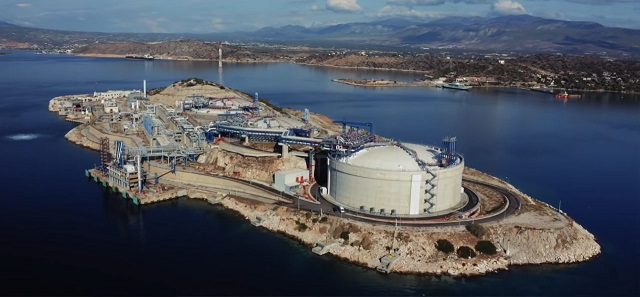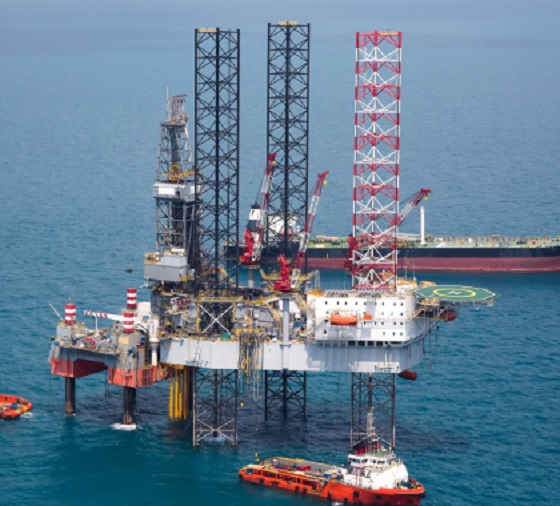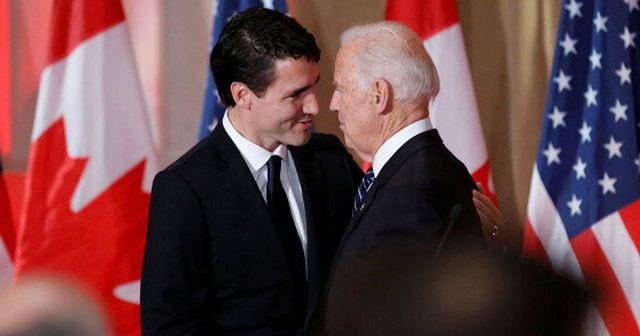Energy
Canada wallows on LNG sidelines, paralyzed by Ottawa’s onerous regulatory system

From the Frontier Centre for Public Policy
By Lee Harding
Mitsotakis said Greece has built a major facility outside the city of Alexandroupolis to process incoming LNG tankers. He said Greece will pump LNG to the rest of Europe and needs more at home as the country abandons coal.
When it comes to fossil fuels, the world wants what Canada’s got. The problem is, Prime Minister Justin Trudeau doesn’t care.
Fresh proof came with the recent visit of Kyriakos Mitsotakis, the first Greek leader to come to Canada in more than 40 years.
According to the office of the Prime Minister Trudeau, Mitsotakis was simply here to march in Montreal’s Greek Independence Day Parade, discuss “shared interests” and cut the ribbon as Greece purchased Canadian-made firefighting planes.
But, during an interview with CTV, Mitsotakis said his country would “of course” like to start importing Canadian liquified natural gas (LNG).
“We are a big entry point for LNG, not just for the Greek market, but also for the Balkans, for Eastern Europe. Theoretically, we could even supply Ukraine,” said Mitsotakis.
“In principle, yes, we are very interested in obtaining LNG at competitive prices.”
Mitsotakis said Greece has built a major facility outside the city of Alexandroupolis to process incoming LNG tankers. He said Greece will pump LNG to the rest of Europe and needs more at home as the country abandons coal.
Much of Europe’s energy has traditionally come from Russia or Middle Eastern autocracies. More than a decade ago, author Ezra Levant made the case for Canada’s “Ethical Oil” as a better alternative. Canada’s status as a democratic state that respects human rights and extracts oil with a minimal environmental footprint is as good as it gets. Mitsotakis, a Harvard-educated investment banker, understands that quite readily today.
“Canada is a country (for) which we share so many values,” said Mitsotakis. “I think we see eye-to-eye on many of the challenges that we face.”
Still, there was no mention of energy exports in Trudeau’s public comments regarding Mitsotakis, nor in official government communications about the visit.
Mitsotakis can take little consolation that his treatment is not unusual, as true as that may be. In the past 18 months, both the Japanese prime minister and the German chancellor returned home without official assurances that Ottawa was eager to offer bulk quantities of Canadian LNG.
Japanese Prime Minister Fumio Kishida came to Canada in January, 2023 making no secret of his “high expectations” to reach an LNG export agreement with Canada.
In August 2022, German Chancellor Olaf Scholz came to Canada hoping to reach an LNG deal. “Canada is our partner of choice,” Scholz said at the time.
Somehow, Trudeau said at a press conference with the German leader that there was no “business case” for LNG exports to Europe. Instead, he took the chancellor to an empty field in Newfoundland that was the chosen site for a future Canadian facility to export carbon-neutral hydrogen.
That will help Germany a little, but not nearly enough. The country turned to Qatar and signed a 15-year LNG export deal.
Canada is currently the world’s fifth largest producer of natural gas. But, as is the case with oil, facilities to sell it overseas are very limited. Canada has no LNG export facilities currently operating. Any LNG exports to Europe would have to go through a US export terminal.
Kitimat, BC will open a major export facility in early 2025, but plans to build an LNG pipeline to ports on the East Coast have fallen apart due to high costs.
On Monday, Alberta Energy Minister Brian Jean said “onerous” regulatory procedures were more to blame.
“With massive natural gas reserves, Canada can no longer wait on the LNG sidelines, burdened by an onerous regulatory system. Our allies and trading partners need us. We must have more LNG export facilities approved and built,” Jean said in a statement.
Jean is right. Canada has scuttled one opportunity after another during the Trudeau era, first by smothering pipeline development in onerous regulations. The Northern Gateway pipeline was the only one the nation banned, citing environmental concerns off the coast of northern B.C., despite the fact that 50 tankers passed the same waters every day with exports from Alaska.
Other proposals, such as the Energy East pipeline, were held up in red tape until its proponents decided the project wasn’t worth it. A 30,000-page application went for not, as did the hope that refineries in the Maritimes could refine Canadian products instead of those from the Middle East.
The trans mountain pipeline was also bound up until the government bought it, after which its progress still went painfully slowly. Years late and six times over-budget at a cost of $34 billion, the “long delayed” pipeline is finally ready for crude deliveries.
Bill C-69, dubbed by former Alberta Premier Jason Kenney as the “No More Pipelines Act”, was declared unconstitutional by the Supreme Court of Canada last fall. The development is welcome but cannot restore lost time.
Canada remains poorly positioned to capitalize on another historic opportunity–the European thirst for oil as it tries to distance itself from Russia. Unfortunately, this problem seems more convenient to Ottawa than not. The Canadian government seems more interested in having zero carbon emissions even if that means zero economy. Too bad that makes zero sense.
Lee Harding is a Research Fellow at the Frontier Centre for Public Policy
Energy
Biden Has Taken More Than 200 Actions Against Domestic Oil, New Report Says

From HeartlandDailyNews
By
President Joe Biden and his administration have taken over 200 actions against the U.S. oil and natural gas industry as energy prices have gone up, according to a new report.
“President Biden and Democrats have a plan for American energy: make it harder to produce and more expensive to purchase,” the Institute for Energy Research states in a new report. “Since Mr. Biden took office, his administration and its allies have taken over 200 actions deliberately designed to make it harder to produce energy here in America.”
The analysis highlights actions Biden took on his first day in office, listing them chronologically through March of this year. The first act was canceling the Keystone XL pipeline, issuing a moratorium on all oil and natural gas leasing activities in the Arctic National Wildlife Refuge and revoking Trump administration executive orders that decreased regulations in order to expand domestic production.
Within a week of being in office, Biden issued additional moratoriums on new oil and gas leases on public lands or in offshore waters and imposed new regulations related to permitting and leasing practices, which were tied up in the courts for years. It was not until last month that a federal court upheld the first oil and natural gas lease sale on federal lands. Last December, the Fifth Circuit also ruled that Gulf lease sales must go forward.
Other actions ahead of the midterm elections include threatening to tax the oil and natural gas industry, blaming them for profiteering. Roughly six months before the general election, his administration has proposed $110 billion tax hikes on oil, natural gas and coal. In response, U.S. Sen. John Barrasso, R-Wyo., led a coalition of 24 senators expressing “grave concern” about his “continued hostility towards American energy production.”
IER published the report after the latest action taken to increase the cost of U.S. oil production and cancel plans to restock the Strategic Petroleum Reserve. The SPR has been depleted to roughly half of what it was when he first took office.
“President Biden had the chance to top up the SPR when prices were still low during the pandemic, but anti-oil-and-gas ideologues within the administration couldn’t bear to do anything that would help out producers when demand was low,” Kathleen Sgamma, president of Western Energy Alliance, told The Center Square. He then drained it “for political reasons and it’s long overdue to fill the SPR back up. Like many other politically driven decisions from this administration that distort energy markets, the government will have to spend more taxpayer money than if it had rational energy policies.”
Ed Longanecker, president of the Texas Independent Producers & Royalty Owners Association, told The Center Square that the Biden administration withdrawing approximately 250 million barrels from the SPR “was another dangerous example of putting politics over national security. The fact that some will believe the decision to cancel contracts to refill the SPR is due to a newly discovered fiscal consciousness is both nonsensical and alarming. Poorly conceived, albeit intentional energy policy results in higher costs for consumers, global emissions, and inflation, while putting our economy and energy security at risk.”
Daniel Turner, Founder and Executive Director for Power The Future, said instead of using American-produced oil to refill the SPR, Biden was “embracing insanity by putting the green agenda ahead of our families and our national security. Only in Joe Biden’s head does it make sense to lower costs by raising fees.” In light of Iran’s recent attacks against Israel, he said, “the world and our allies need a strong America that is fully utilizing our energy strength. Instead, the only things Joe Biden wants to strengthen is Iranian oil and Washington’s tax revenue.”
As the Biden administration imposes more fees on American oil producers, Iran’s oil exports reached $35 billion within the last 12 months, according to Iranian Labour News Agency. “Despite the reimposition of U.S. sanctions on Tehran in 2018, Chinese purchases of Iranian oil have allowed the country to maintain a positive trade balance,” Reuters reported. “Without oil exports, Iran would have registered a $16.8 billion trade deficit.”
U.S. House Republicans last month passed several bills and resolutions to strengthen the U.S. oil and natural gas industry, The Center Square reported. Only a handful of Democrats, largely from Texas, supported them.
Texas leads the U.S. in oil and natural gas production, having broken records in the last few years, The Center Square has reported. Because the majority of oil and natural gas is produced on private land and a bipartisan group of Texas elected officials and regulatory agencies are supportive of the industry, Texas has been able to achieve what most states have not.
Those in the Texas energy industry argue that, without their ingenuity and technological advancement, the U.S. would not be as energy independent as it is and prices would be higher. When the Russian-Ukrainian crisis hit, it was Texas LNG exports that provided a “lifeline” to European countries, a TIPRO analysis found.
“With so much uncertainty in the world, the need for reliable, responsibly produced energy from a stable trading partner has never been more crucial,” Texas Oil & Gas Association President Todd Staples said. “Texas is that trade partner. Our producers, pipelines, refineries, and exporters answer the call to alleviate the global energy crisis, made worse by war.”
He also argues that Texas’ production records “are not guaranteed. We cannot take for granted that this industry can continue to rewrite its record book in the face of federal policies blatantly designed to undermine progress. Delayed permits, canceled pipeline projects, closed and delayed federal leasing programs and incoherent regulations hurt American consumers and stifle our ability to deliver energy freedom and security around the world.”
Bethany Blankley is a contributor to The Center Square.
Originally published by The Center Square. Republished with permission.
Energy
Net Zero’s days are numbered? Why Europeans are souring on the climate agenda

From LifeSiteNews
By Frank Wright
Dr. Benny Peiser recently spoke about how the E.U. and various European nations have started a ‘rollback’ of their climate agendas due to ‘increasing costs and increasing hostility from the public.’
A recent presentation given in Canada brings welcome news to the reality-based community: Net Zero’s days are numbered. The costs of the “utopian” green agenda have been realized, and the public are not buying it any more.
This is the message of Dr. Benny Peiser of the Global Warming Policy Foundation, who was in Calgary on April 9 to speak about “Europe’s Net Zero rebellion and the implications for Canada.”
“The game is over for anyone who is willing to commit industrial suicide through the implementation of Net Zero policies,” he says, going on to cite public opinion and political decisions which are driving the political agenda of the future.
Peiser shows how the European Union and the nations of Sweden, France, Germany, Britain, and Italy have started this “rollback” – due to “increasing costs and increasing hostility from the public.”
Saying that Canada, where he spoke, is “maybe five years” behind the Net Zero rollback in Europe, he said the agenda was in retreat there as its “astronomical” costs have now been grasped by the public.
“This is direct,” he says.
We have been telling [the public] for 15 years this will be very expensive … and your energy bills are going up because of the renewables.
This is all far too abstract for people. They don’t get that.
Citing reports which show that Net Zero will cost over a trillion euros a year, every year, he says:
This they get directly – the car they can’t drive, the way they heat their homes. What they’re allowed to do.
That has caused huge opposition and a lot of headache for governments.
Peiser says political parties across Europe have realized that they face being swept from power in the forthcoming elections in June.
Politics pivots back to reality
The headaches Peiser cites include the near collapse of the German government late last year over a policy to make heat pumps compulsory. A week after Peiser’s talk, news came that the Scottish coalition government has collapsed, with the Greens withdrawing support from the ruling SNP after the abandonment of climate change targets.
Politicians are faced with a choice between electoral oblivion and public opinion, and Peiser says this has led to structural change in European policy.
Peiser believes that the enormous public support behind the farmer protests, coupled with green policies creating crisis in the German government, has made the E.U. think again.
“As a result of these protests governments and the European Commission itself have begun to cave in,” Peiser said. “They are not just losing farmers but a large chunk of the public at the same time.”
Peiser is aware that election cycles see politicians shelve unpopular policies – only to resume them after the votes have been counted. Yet he notes a structural change in priorities.
“The E.U. in its draft agenda for the next five years has decided to relegate climate and shift to defense,” he continued, saying that the European Union is shifting from the green agenda to the “real agenda.”
This pivot to reality is one that is long overdue. As Peiser points out, the case for Net Zero is one that is made out of words, not of facts. To take one example, that of electric vehicles, he says “the biggest fear in Europe is not climate change. The biggest fear is cheap electric vehicles from China.”
The E.U.’s recent Net Zero Industry Act (NZIA) has been shaded by economic and industrial concerns, as well as fear from the climate lobby that it too is a rollback of Net Zero commitments.
Passed on April 25, its name alone would suggest business as usual for the climate agenda.
However, in a press conference introducing the Act last November, German “conservative” MEP Christian Ehler was keen to anticipate criticism from the Green lobby, saying “this is not an attempt to scrap social achievements or environmental law.”
Ehler’s emphasis here was on industry and whether Europe will have an economic and industrial future – or not.
Ehler stressed the need to keep industry “on our side” and that the past practices of regulation threatens the economic future of European industry,
It’s simply reflecting the very fact that our industry is burdened by regulation in a way that we can’t expect them to succeed – if we really want to have them on our side – and if we really have to have an economic future for the European industry.
READ: New documentary exposes climate agenda as ‘scam’ to increase globalist power and profit
An act in name only
This may explain why, according to two experts, the Act is in fact just words. Yet it is not only the threat of Green-inspired regulation which faces European industry.
Chinese dominance of the market has rendered E.U. Net Zero measures to create a “sustainable” industry producing “green technology” such as solar panels mere “paper tigers,” according to one analyst.
Simone Tagliapietra, a senior fellow at think-tank Bruegel said this in response to the E.U.’s new Act.
His comments, reported by Euractiv on April 26, included an explanation why the legislation “doesn’t change anything.”
A second analyst, Nils Redeker of the Berlin-based Jacques Delors Centre, agreed according to Euractiv that the new measures “could, in practice, and will most likely, be ignored.”
The green lights are going out all over Europe, most obviously in what was once its industrial and economic powerhouse.
Germany in crisis
Following a budget crisis which also threatened the survival of the German government’s “Red/Green/Yellow” or “traffic light” coalition last November, the former E.U. paymaster of Germany was said to be “likely in recession.”
The February 19 report by the Daily Telegraph noted the resulting “uncertainty” over Net Zero implementation. This is another sign of the impact of reality on the deeply unpopular policies of what Peiser called the “utopia” imagined by the Green lobby.
The Daily Telegraph also reported that the German central bank had warned of “no end in sight” for the “ongoing weakness” of Europe’s largest economy.
The Bundesbank added that “uncertainty regarding climate and transformation policy remains elevated.”
In his analysis of the electoral cost of Net Zero, Peiser seems to have read the room very well. The political climate has changed.
As the British government is faced with power cuts over soaring demand for electricity, its refusal to build more gas-fired power stations may see the actual lights go out as well as the figurative beacon of an agenda the Conservative Party have greenlit for years.
U.K. climate chief quits
The outgoing head of the U.K.’s climate change committee has conceded that Net Zero is a toxic brand:
Net Zero has definitely become a slogan that I feel occasionally is now unhelpful, because it’s so associated with the campaigns against it.
Chris Stark, who looks exactly as you would imagine he would, blamed a minority faction of imaginary “culture warriors” whilst saying on April 22 in The Guardian that the cost of living was effectively irrelevant.
“It’s the culture warriors who have really taken against it,” said Stark. “A small group of politicians or political voices has moved in to say that net zero is something that you can’t afford, net zero is something that you should be afraid of … But we’ve still got to reduce emissions. In the end, that’s all that matters.”
Stark’s missionary zeal is untouched by a Europe-wide survey cited by in Peiser’s presentation. According to the survey, conducted in January by the European Council on Foreign Relations (ECFR), it is the climate zealots themselves who are the minority.
With a sample from 12 European nations, it shows a clear majority in 10 countries for “reducing energy bills” over “reducing carbon emissions.” In Germany, support for lower energy costs is more than twice that for the higher ones promised by “reducing emissions.”
Peiser explained, “What [the survey] tells you is that a clear minority of Europeans are prioritizing the climate issue over their energy cost issue.”
READ: Climate expert warns against extreme ‘weather porn’ from alarmists pushing ‘draconian’ policies
Describing the clear majority of European citizens against the cost of Net Zero, he says “that is the most dramatic change I’ve seen in the last 20 years.”
This “realization of cost moment” is one which Peiser shows had been predicted in the 1970s by Anthony Downs, whose “issue attention cycle” predicted public understanding of the true cost as the point beyond which climate policies will no longer enjoy public support.
The graph roughly charts the interest and support of the public, which moves from ignorance of the “problem” to generate public support through a sense of alarm. This enthusiasm steeply fades as the public realizes the price of the product they have been sold.
Yet this process is based on the common sense to the common man. The U.K.’s former climate change chief Christopher Stark is immune to this determining factor.
He displays the alarming detachment from reality which typifies the Net Zero zealot, and which Peiser warns is proving electorally – and industrially – suicidal.
Speaking of the implementation of Net Zero, Stark claimed, against rapid deindustrialization, soaring energy prices, and former measures to restrict cars and home heating to costly and inferior alternatives, that “the lifestyle change that goes with this is not enormous at all.”
This also ignores the likely “power cuts” that Britain will face, given a massive upsurge in Net Zero-driven electricity demand.
The Daily Telegraph, reporting accusations from the Green lobby that Rishi Sunak was “abandoning” Net Zero, said on March 17 that without more gas fired power generation, support for Net Zero “would collapse.”
The report continued that “the U.K. would almost certainly endure power cuts, causing civic and commercial havoc, without more gas-fired baseload in place.”
The piece concludes with a verdict which is now becoming a theme: “And then the case for tackling climate change, already increasingly questioned, would become politically toxic.”
The rule of law – or the rule of lawyers
As Peiser notes, this toxification has weakened the power of politics itself, with the rule of law being replaced by the rule of lawyers. He notes a recent ruling by the European Court of Human Rights, which condemned the Swiss government for “violations of the Convention [on Human Rights] for failing to implement sufficient measures to combat climate change.”
Peiser said the ruling showed that democratic majorities do not have the legal power to refuse an agenda enforced by activist judges. He went on:
The judges in their in their ruling said it’s kind of naive to think that democracy would work just with majorities in Parliament and that only judges can rule or decide what makes legal sense – that’s why it’s so important for judges to tell parliaments what they should do.
That’s essentially what they were saying today.
Peiser was speaking on the same day the ruling was announced, which according to a Swiss report will “have a direct impact on the Council of Europe’s 46 member states” and that “its ramifications will extend to the whole world.”
This element of legal insurrection is one direct example of how the sovereignty of democracy is being undermined. In this case, a group of elderly female climate campaigners received a sympathetic hearing from the ECHR’s presiding judge, Siofra O’Leary. Her judgment overruled the Swiss courts’ dismissal of the case. It read:
The Court found that the national courts had not provided convincing reasons as to why they had considered it unnecessary to examine the merits of the complaints. They had failed to take into consideration the compelling scientific evidence concerning climate change and had not taken the association’s complaints seriously.
As Peiser warns, we are ruled by Science Followers, whose emotional enthusiasm for the climate panic talks past the costs of the sale of this agenda. It is a product which most people now recognize promises the permanent collapse of living standards in the West, and is taking democracy down with cries for climate “justice.”
Suicidal policy vs. ‘populism’
Peiser says Net Zero is already “suicidal” – and not in name only. Changing the branding will not wash with voters, Peiser says, as the impact of cost and on freedom is “direct.”
This, he says, is what is driving the beginning of the end of Net Zero.
“Europeans have been told that this Net Zero issue and renewables and so on will make life easier for people.” Instead, he says, “the opposite has happened.”
They’ve been told that energy costs would go down. They’ve gone up.
He observes a factor which could apply to practically any of the policies he also claims are driving “populism.”
So people are beginning to realize that what they’ve been told hasn’t actually materialized.
The opposite has materialized.
Peiser himself notes that this “opposite effect” is driving the rise of “populist parties … skeptical of mass immigration, of Net Zero and of other mainstream policies.”
He says, “I don’t know exactly why they’re called populist but something makes them popular.”
Yet his own presentation shows a simple explanation. What is called “populism” is simply a reaction to the insanity of the policies of national suicide presented as wisdom. The emergence of these parties is the opposite reaction to a political system whose every argument is a contradiction of reality.
Peiser says that this political correction is coming, and soon.
The mainstream parties are concerned that they will hemorrhaging voters.
That’s what the prospects are for the elections in June.
His assessment is shared by the European Council on Foreign Relations, which predicted a “sharp right turn” in the forthcoming E.U. Parliament elections.
He says that for Europe “there might be – for the first time – a center right populist majority in Parliament. If that were to happen of course all bets are off.”
What is more, Peiser concludes that political climate change is coming home – to yours:
That’s the situation in Europe which sooner or later will come to a theater close to you.
-

 Addictions1 day ago
Addictions1 day agoCity of Toronto asks Trudeau gov’t to decriminalize hard drugs despite policy’s failure in BC
-

 Business2 days ago
Business2 days agoWhen politicians gamble, taxpayers lose
-

 Automotive1 day ago
Automotive1 day agoVehicle monitoring software could soon use ‘kill switch’ under the guise of ‘safety’
-

 Alberta1 day ago
Alberta1 day agoAlberta government should eliminate corporate welfare to generate benefits for Albertans
-

 International2 days ago
International2 days agoU.S. birth rate hit record low last year, signaling surge in childlessness
-

 Environment2 days ago
Environment2 days agoClimate Alarmists Want To Fight The Sun. What Could Possibly Go Wrong?
-

 Bruce Dowbiggin1 day ago
Bruce Dowbiggin1 day agoIt Gets Late Early These Days: Time To Bounce Biden & Trudeau?
-

 National1 day ago
National1 day agoBritish Columbia quickly shoots down bill to ban men from competing in women’s sports







